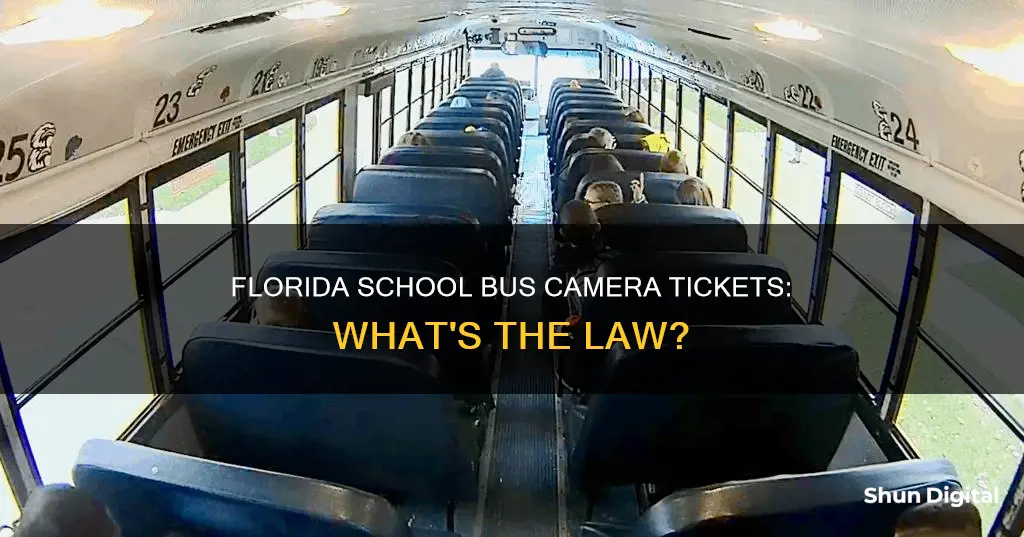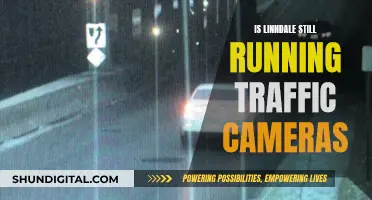
School bus cameras in Florida have been a topic of discussion and controversy in recent years. The state has authorized schools to install cameras on buses to catch and ticket drivers who pass stopped buses while loading or unloading students. While some districts have started implementing these cameras, others are still considering the idea due to concerns about privacy and the burden of enforcement. The fine for passing a stopped school bus starts at $165 and can go up, and drivers have the opportunity to challenge the findings. This measure aims to address the issue of illegal passing of school buses, with studies showing a high number of unreported incidents in the state.
| Characteristics | Values |
|---|---|
| Fine for passing a stopped school bus | Starts at $165 |
| Number of illegal passes in a typical school year in Florida | 1.9 million |
| Average number of citations issued per year for illegally passing stopped school buses in the past five years | 2,700 |
| Location of pilot program to test out the cameras | Osceola County |
| Number of violators caught in the first four days of school in Hillsborough County | 2,300 |
| Number of violators caught in the first two weeks of school in Miami-Dade County | 11,500 |
| Fine for violators in Miami-Dade County | $225 |
What You'll Learn

School bus camera tickets: what are the penalties?
School bus camera tickets are a recent development in Florida, with the law allowing districts to use bus cameras signed into existence in May 2023 and enforced from July 1, 2023. The use of these cameras is intended to improve safety for children, who are considered precious cargo.
Motorists are required by law to stop when approaching a school bus that is stopped with its red lights flashing and "STOP" arms extended. This applies to all drivers moving in either direction on a two-way street or highway, unless there is a physical barrier or at least five feet of unpaved space between the lanes.
The penalties for passing a stopped school bus in Florida include:
- A moving violation subject to citation
- Requirement to complete a basic Driver Improvement Course upon conviction
- Four points on your driver's license
- A minimum fine of $265, which increases to $465 if passing on the side where children enter and exit
Penalties increase for repeat offenders. If a motorist is ticketed again within five years, their license can be suspended for a minimum of 90 days to a maximum of six months, in addition to the standard fine.
It is important to note that these penalties are designed to prioritize the safety and welfare of children, and drivers should always exercise caution and follow the law when encountering a school bus.
The Evolution of DCS Cameras: Beyond Kodak
You may want to see also

School bus camera enforcement: how does it work?
School bus camera enforcement is a system designed to improve road safety and protect children from injury when getting on or off a school bus. It involves the use of cloud-connected, weather and dust-proof cameras that capture video footage of motorists who illegally pass stopped school buses.
Illegal Passing of a School Bus:
When a vehicle illegally passes a school bus, the BusPatrol cameras are activated and begin recording. This usually occurs when a driver fails to stop for a school bus that is loading or unloading students, endangering the safety of the children.
Multi-Angle Camera Capture:
The BusPatrol system is equipped with a multi-angle camera box that captures the violation from multiple perspectives. This ensures that the footage clearly identifies the vehicle and its actions.
Footage Storage and Encryption:
The camera footage is automatically stored in an onboard DVR (digital video recorder) device. This device is shock-resistant and built to withstand adverse weather conditions, ensuring that the footage is securely stored. Additionally, the footage is encrypted and sent to a secure cloud platform for further processing.
Secure Cloud Platform and Police Review:
The encrypted footage is uploaded to a secure server facility, where it can be accessed by the police for review. This ensures that only authorized personnel have access to the sensitive footage.
Evidence Package Creation:
A BusPatrol safety specialist reviews the school bus camera footage, driver information, weather conditions, and time of day. They create an evidence package that includes all relevant information for law enforcement to review. This step ensures that the police have clear and concise evidence to support any potential violations.
Submission of Evidence to Police:
The BusPatrol safety specialist submits the evidence package, including the camera footage, to the police for their determination. The police then review the footage and evidence package from all angles to make an informed decision.
Violation Determination and Fines:
The police carefully examine the stop-arm camera footage to determine if a violation has occurred. If a violation is approved, the driver will receive a ticket and be required to pay a fine. This enforcement action helps educate drivers and deter future violations, leading to safer roads and a better driving culture.
Driver Education and Behaviour Correction:
According to BusPatrol's data, 99.8% of drivers who receive a fine for illegally passing a school bus do not reoffend. This indicates that the school bus camera enforcement system is effective in educating drivers and changing their behaviour. As a result, roads become safer for everyone, especially children using school bus services.
Charging the DSC-S780 Camera: A Step-by-Step Guide
You may want to see also

School bus camera safety: is it effective?
School bus camera safety programs are an effective way to improve safety and change the driving culture around school buses. These programs use advanced technology, such as AI-enabled cameras, cloud-connectivity, and software, to capture and generate evidence of vehicles that illegally pass stopped school buses. This evidence is then used by law enforcement to issue citations and create accountability on the road.
One example of a successful school bus camera safety program is BusPatrol, which has a fleet of over 10,000 AI-enabled school buses in North America. BusPatrol's technology has helped to reduce the number of cars that illegally pass stopped school buses, creating a culture of responsibility and awareness around school buses and children. Their data shows that 94%-98% of motorists who receive a ticket through their safety program do not receive a second one, indicating that drivers are responsive to the evidence presented to them and are educated on school bus stop laws and their consequences.
In addition to improving safety, school bus camera safety programs can also provide benefits to school districts and municipalities. For example, BusPatrol's program comes at no cost to partners, with revenue from tickets providing a source of funding for education campaigns, purchasing enhanced safety equipment, or investing in other student safety initiatives.
The effectiveness of school bus camera safety programs can also be seen in the reduction of stop-arm violations. According to data from the National Association of State Directors of Pupil Transportation Services (NASDPTS), there are over 17 million stop-arm violations in the US each year, putting children at risk as they board and exit the bus. School bus camera safety programs help to enforce school bus stop laws and reduce the number of these violations, making the journey to and from school safer for students.
While school bus camera safety programs have been successful in improving safety and changing driver behavior, there may be some concerns about privacy and the potential for abuse of power. For example, in Florida, there have been reports of school bus drivers racking up red-light camera tickets and having them disappeared to maintain a clean record. This highlights the importance of proper regulation and oversight of these programs to ensure they are used ethically and in the best interest of public safety.
The 1970 SS Cameros: A Limited Edition Run
You may want to see also

School bus camera legality: are there privacy concerns?
School bus cameras are now being used in Florida to monitor traffic violations and enforce the law. This has sparked a discussion about the legality and privacy concerns surrounding the use of these cameras. While some people may question the legality of these cameras, it appears that their use is, in fact, legal. However, there are still important privacy considerations that need to be addressed.
Legality of School Bus Cameras
The use of school bus cameras for traffic enforcement appears to be legal in Florida. According to a Reddit user, the law allowing districts to use bus cameras was signed into existence in May 2023 and went into effect on July 1, 2023. This suggests that the appropriate legal measures have been taken to implement this new technology.
Privacy Concerns
While the use of school bus cameras may be legal, there are valid concerns about student privacy and the potential for abuse of the footage captured by these cameras.
One major concern is the protection of students' Personal Identifying Information (PII). The law mandates that children's privacy be protected at all times, and this includes their identity and PII. School bus camera systems capture footage of students, which could potentially be misused or accessed by unauthorized individuals. This is especially concerning given that private companies often own and operate these cameras, and there is limited regulatory power over them.
To address privacy concerns, schools should follow the guidelines set by the Department of Education's FERPA (Family Educational Rights and Privacy Act) law. FERPA states that if a parent requests information or video regarding an incident, schools should disclose only the portion that pertains to their own child's involvement. If multiple students are in the video, the faces or PII of the other students should be redacted or blurred to protect their privacy.
Additionally, schools should invest in video redaction software to ensure student privacy. This software can help remove the burden of costs and legal disputes that may arise from human error in redacting videos. It also increases accuracy, ease of use, and speed, while reducing the need for dedicated IT staff for redaction services.
In conclusion, while the use of school bus cameras in Florida may be legal, it is important to address privacy concerns to protect the rights of students. Schools should follow FERPA guidelines, obtain parental consent, and utilize video redaction software to ensure that student privacy is maintained.
Converting to Camera Raw: A Step-by-Step Guide
You may want to see also

School bus camera ownership: who benefits from the revenue?
School bus cameras are an increasingly common feature, with many benefits for student safety and driver accountability. These cameras are typically activated when the bus's flashing lights are on and the "stop" bar is extended, capturing images of any vehicles that pass the bus. The footage can be used as evidence for traffic tickets, with municipalities mailing out $250 fines to vehicle owners. This method of traffic law enforcement has been compared to the use of red-light cameras.
The largest maker of school bus cameras in the US is BusPatrol America, which serves about 90% of the market. BusPatrol operates in partnership with local municipalities, which share in the revenues generated from the tickets. This revenue-sharing model provides a financial incentive for municipalities to adopt these camera systems.
In Suffolk County, which introduced bus cameras in 2021, there was a reported 42% reduction in stopped-bus violations over three years. This suggests that the cameras can be an effective tool for modifying driver behavior and improving safety around school buses.
While the primary purpose of school bus cameras is to enhance student safety and enforce traffic laws, the financial implications of the resulting tickets cannot be ignored. The revenue generated from these fines becomes a source of income for both the camera companies and the local municipalities that adopt the technology. This dynamic creates a potential conflict of interest, as there is now a financial incentive to maximize the number of tickets issued.
Ultimately, the benefits of school bus camera ownership extend beyond the financial gains for companies and municipalities. The improved safety for students and drivers is a crucial outcome. However, it is essential to consider the potential for revenue-driven motivations to influence the use of these cameras and the enforcement of traffic laws.
Best Cameras for Adobe Raw Native Shooting
You may want to see also
Frequently asked questions
Yes, school bus cameras are granting tickets in Florida. The fine for passing a stopped school bus starts at $165.
The fine for passing a stopped school bus in Florida starts at $165 and can go up to $265 depending on the direction of passing. A repeat offense can result in a license suspension of up to one year.
According to a study by the University of South Florida, approximately one out of every three school buses in operation during a single day of data collection was passed illegally. This adds up to nearly 1.9 million illegal passes in a typical school year.







